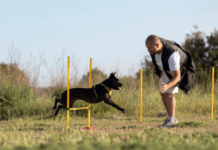Last Updated on January 7, 2023 by Dogs Vets
How to train a dog to stop barking
Training a Dog to Stop Barking: Barking is a natural behavior for dogs, but excessive barking can be a nuisance for both the dog and their owner.
If you’re struggling to stop your dog from barking excessively, there are several training techniques you can try.
- Identify the cause of the barking: Is your dog barking at people or animals outside, or is there a specific trigger, such as the doorbell or a certain sound? Understanding the cause of the barking can help you determine the best course of action.
- Try positive reinforcement: Rewarding your dog for quiet behavior with treats, praise, or toys can be a effective way to reduce barking. You can also use a clicker to mark the desired behavior, followed by a reward.
- Use a “quiet” command: Choose a word or phrase, such as “enough” or “quiet,” to use as a command when you want your dog to stop barking. Consistently using the same command and rewarding your dog for responding can help them learn to stop barking on command.
- Ignore the barking: In some cases, paying attention to your dog when they bark, even if it’s to scold them, can reinforce the behavior. Instead, try ignoring the barking and rewarding your dog for being quiet.
- Use a spray bottle: If your dog is barking at specific triggers, such as the doorbell or a certain sound, you can try using a spray bottle filled with water to interrupt the barking. Be sure to only use this technique in conjunction with positive reinforcement, not as a punishment.
- Consider professional training: If you’ve tried the above techniques and your dog’s barking persists, you may want to consider seeking the help of a professional trainer or behaviorist. They can assess the cause of the barking and help you develop a training plan specific to your dog.
- Be patient: Training a dog to stop barking can take time and consistency. It’s important to be patient and not get frustrated with your dog if they don’t immediately stop barking.
Questions People are Asking
-
How do I know if my dog’s barking is excessive?
A: Excessive barking is generally defined as barking that is ongoing and persistent, or that occurs in inappropriate situations. If your dog’s barking is disrupting your household or disturbing your neighbors, it may be considered excessive.
-
Is it okay to use punishment to stop my dog from barking?
A: Punishment is not an effective way to stop barking and can cause negative effects, such as fear, aggression, and anxiety. It’s important to use positive reinforcement techniques, such as rewarding your dog for quiet behavior, to reduce barking.
-
My dog barks at people or animals outside. What can I do?
A: If your dog barks at people or animals outside, you can try closing the curtains or blinds to block their view, or moving them to a room where they can’t see what’s happening outside.
You can also try using a “quiet” command and rewarding your dog for being quiet when they see someone or something outside.
-
My dog barks at the doorbell. What can I do?
A: You can try using a spray bottle filled with water to interrupt the barking, and then rewarding your dog for being quiet. You can also try desensitizing your dog to the doorbell by ringing it repeatedly and rewarding your dog for staying calm.
-
Can a professional trainer or behaviorist help with my dog’s barking?
A: Yes, a professional trainer or behaviorist can assess the cause of your dog’s barking and develop a training plan specific to your dog’s needs. They may also be able to suggest other techniques, such as using a barking collar or teaching your dog to bark on command, to help reduce barking.
-
Is it possible to completely eliminate barking?
A: It is not realistic to expect that you can completely eliminate barking in a dog, as barking is a natural behavior. However, it is possible to reduce excessive barking and teach your dog to bark appropriately.
-
My dog barks when they are left alone. What can I do?
A: Separation anxiety can be a common cause of barking when a dog is left alone.
To address this issue, you can try gradually increasing the amount of time you leave your dog alone, providing them with plenty of mental and physical stimulation while you’re away, and using positive reinforcement to reward calm behavior.
-
My dog barks when they are excited. What can I do?
A: You can try teaching your dog a “quiet” command and rewarding them for being calm, as well as providing them with plenty of physical and mental exercise to help reduce their excitement level.
-
Is it possible to teach an older dog to stop barking?
A: It is possible to teach an older dog to stop barking, but it may take longer and require more patience and consistency. Be sure to use positive reinforcement techniques and be patient as you work with your older dog to reduce their barking.
-
Can barking collars be effective in reducing barking?
A: Barking collars can be effective in reducing barking in some cases, but it’s important to use them responsibly and only as a last resort.
It’s always best to try positive reinforcement techniques first, and to consult with a professional trainer or behaviorist before using a barking collar.
Fact Check
We hope you enjoyed reading this article. What are your thoughts on the topic?
“At [Dogsvets.com], our goal is to bring you the most accurate and up-to-date information on all things pet-related.
If you have any additional insights or would like to advertise with us, don’t hesitate to get in touch.
If you notice any errors or discrepancies in our content, please let us know so we can correct them.
We welcome your feedback and encourage you to share this article with others.”

















